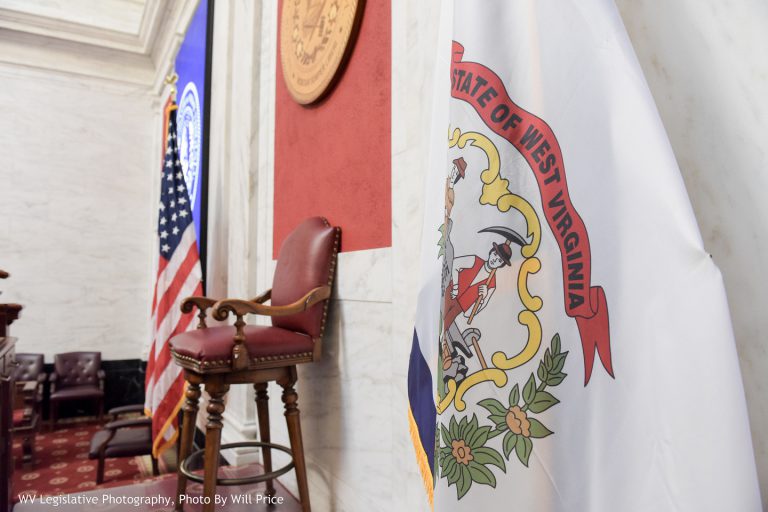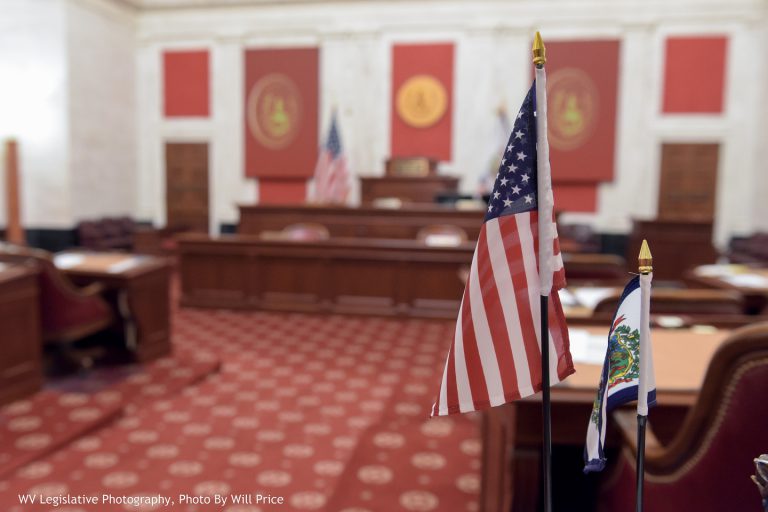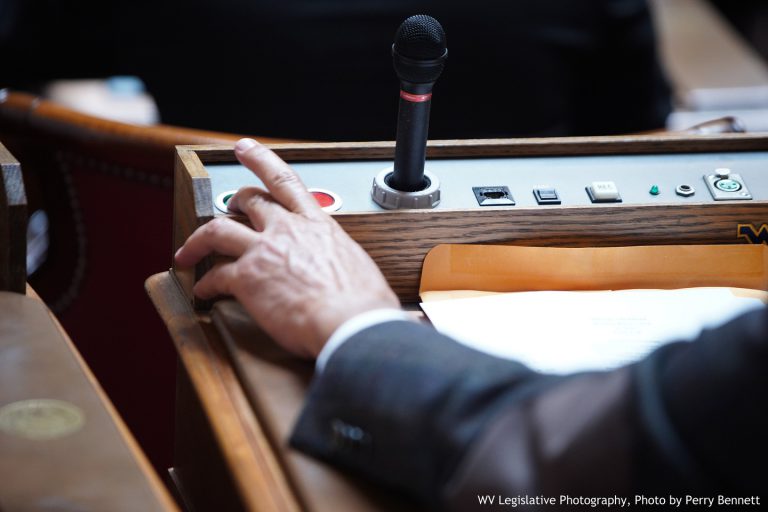Completed Legislation
As of 7 p.m., Wednesday, March 7, 2007, the 57th day of the Regular Session, 1,276 bills have been introduced in the House, 158 of which have been passed by the House; and, 759 bills have been introduced in the Senate, 222 of which have been passed by the Senate. Below is a sampling of the 89 bills that have completed legislative action:
Senate Bill 18 will require insurance providers (both the Public Employees Insurance Agency and private companies) and Medicaid to cover the costs of medically necessary kidney screening. The screening will include any combination of tests recommended by the National Kidney Foundation – specifically, blood pressure, urine albumin or protein, and serum creatinine tests.
Senate Bill 66 will set a flat fee of $2.50 per day for people in home confinement. The fee was previously set at no more than $5. Money collected from this fee will go into the state Community Corrections Fund.
Senate Bill 70 will penalize contractors and subcontractors who knowingly employ illegal workers. The penalty would include fines from $100-$1,000 for the first offense; $1,000-$2,000 for a second offense, plus a 3-month suspension of the contractor’s license; and $3,000-$5,000 for a third offense.
Senate Bill 104 will establish that all public retirement plans under the Consolidated Public Retirement Board must make annuity payments by the 25th day of the month, except for December, when payments will be due on the 18th. If the payment day falls on a state holiday or weekend, the payment will be due the next business day.
Senate Bill 105 will impose a penalty on county commissions that are late in making payments owed to the Deputy Sheriff’s Retirement Fund. This fund is paid for by fees collected by sheriffs for performing certain services, including background checks, fingerprinting and motor vehicle identification. The penalty will be the value, with interest, of the fees that have yet to be transferred into the Fund, with a minimum penalty of $50. Such payment must be paid by the 15th day of the month following the service fee due date.
Senate Bill 134 will require employee contributions and a detailed summary of those contributions be submitted by the member’s employer to the State Teachers Retirement System within 15 days following the end of the calendar month.
Senate Bill 180 will allow retired public safety officers who are participants or members under the retirement plan administered by the board, to voluntarily elect to have amounts from an eligible retirement plan distributed in order to pay for qualified health insurance premiums. The dollar amount of theses distributions may not exceed $3,000.
Senate Bill 181 will amend current law to provide members of the Board of Banking and Financial Institutions compensation in line with the Legislative per diem pay. The bill increases board members’ per diem pay from $50 to $150 and also specifies that reimbursed expenses must be actual expenses.
Senate Bill 217 will extend the time for Piedmont City Council to meet as a levying body. The bill allows the council to meet as such a body from March 7-28, 2007 and from April 17, 2007 to May 31, 2007.
Senate Bill 387 will provide that an honorably discharged veteran may not be denied the opportunity to have a bronze military grave marker placed on his or her gravesite.
Senate Bill 413 will clarify procedures for seizing abandoned, neglected or cruelly treated animals. If found with life threatening conditions, a licensed veterinarian would determine if the animal should be euthanized. If a magistrate is not convinced an animal was neglected or cruelly treated, then the magistrate may dismiss charges and return the animal to its original owner.
Senate Bill 414 will raise the fees charged by circuit clerks for various services, such as garnishing a person’s salary and executing a property seizure to meet the payment of a legal judgment.
Senate Bill 416 will create misdemeanor penalties against a person who knowingly attempts to defeat a drug or alcohol screening test, as well as penalize distributors of a product that can defeat such a test. Substances that might alter a urinary or other fluid sample to give a false result include: Bleach, Chromium, Creatinine, Detergent, Glutaraldehyde, Glutaraldehyde/squalene, Hydrochloric acid, Hydroiodic acid, Iodine, Nitrite, Peroxidase, Potassium dichromate, Potassium nitrate, Pyridinium chlorochromate, and Sodium nitrite. Upon the first offense, a person could be fined up to $1,000, with an increase to a $5,000 fine for the second offense. The third and subsequent offences warrant up to a $10,000 fine and/or up to one year in a regional jail.
Senate Bill 442 establishes a new grievance procedure for West Virginia public employees, and creates the West Virginia Public Employees Grievance Board. The new board would consist of five members who are to be appointed by the Governor. It also gives the board new powers, duties, rule-making authority and data collection responsibilities in an effort to make the grievance process more fair, efficient, cost effective and consistent.
Senate Bill 489 relates to the duties of the Workforce Investment Council in the development of a strategic five-year state workforce investment plan that would attempt to establish a public agenda with goals of promoting the success of the state. The main goal of this legislation is to find jobs for PROMISE scholars in West Virginia.
Senate Bill 603 will establish the 21st Century Tools for 21st Century Schools Technology Initiative. The bill states the provision of technical equipment and services to students and teachers must be based on a plan aligned with the goals of the West Virginia 21st Century Strategic Technology Learning Plan. This program will give students, grades prekindergarten through twelve, the knowledge and skills needed to succeed in the twenty-first century. This bill will replace and enhance current technology programs to allow West Virginia students to develop proficiency in content, technology tools and learning skills.
Senate Bill 607 will amend several provisions of state law relating to the election of political party executive committees and the filling of vacancies on these committees. Among these provisions, the bill: provides that if the newly elected executive committee meets before July 1, the new committee will serve the remainder of the outgoing committee’s term and is authorized to conduct business; authorizes the chair of the state executive committee to fill a vacancy if the county chair fails to act and the failure to fill the vacancy prohibits the district committee from conducting business; and, requires the county clerk to submit the results of executive committee elections to the Secretary of State.
Senate Bill 618 will require the certificate of announcement for write-in candidates to be filed within 42 days, rather than 21 days, before an election.
Senate Bill 641 will define the term “Public Service Commission motor carrier inspectors and enforcement officers” for purposes of inclusion into the criminal provisions concerning malicious and unlawful wounding, battery and assault.
Senate Bill 708 will make changes to current law dealing with the registration of charities. This bill will clarify that solicitation and receipt of donations and grants is the same as solicitation of funds for purposes of determining which organizations are required to register as charities.
House Bill 2712 requires the Commissioner of Banking, along with the West Virginia Board of Banking and Insurance, to apply similar standards to that of federal bank regulators. The Commissioner and Board will have to determine whether a bank will present a significant concern or raise a legal or policy issue when the bank is filing the application that establishes the bank branch.
House Bill 2870 allows courts to order payment into the Domestic Violence Legal Services Fund under certain circumstances. A court can force the losing party of a lawsuit to pay an amount equal to the attorney’s fee into the fund in the following situations: when the losing party is required to pay an attorney’s fee; or, when the losing party’s lawyer tells the court that the party will not be charged a fee.
House Bill 2908 removes an outdated reference in state law regarding the determination of the value of livestock killed by a bear. When a complainant reports a bear has killed his or her livestock, the value of the loss is established by the fair market value. This bill removes previous state law, which stated, “in no event shall the fair market value of the livestock exceed twice the assessed value of the livestock for personal property taxes.”
House Bill 2973 declares certain claims against the state of West Virginia to be moral obligations of the state. The State Auditor will authorize payments to organizations and individuals who have filed claims resolved by the Court of Claims. The money paid to the complainants will come from the general revenue fund.
House Bill 2988 relates to the West Virginia Tax Procedure and Administration Act. This bill defines what a return is for the purpose of aiding the administration of taxes.
House Bill 2990 makes technical corrections to assure the proper collection of offset fees. The bill changes Internal Revenue Service (IRS) to Tax Commissioner since the Tax Commissioner imposes offset fees, not the IRS.
House Bill 3073 prohibits financial institutions, state banks or out-of-state banks from establishing or maintaining a branch in West Virginia on, or within, one-half mile of the premises or property of an affiliate if the affiliate is engaged in commercial activity. For this bill, commercial activity means activities in which a bank holding company, financial holding company, a national bank or national bank financial subsidiary may not engage in under federal law.
House Bill 3090 transfers the Weston State Hospital Institutional Farm, located in Lewis County, from the Department of Agriculture to the Department of Health & Human Resources. The Department of Agriculture will retain the oil, gas and mineral rights. The Department of Health & Human Resources will now be authorized to sell, lease, donate or transfer the property only if the communication tower, located on the property and owned by the Lewis County Commission, can stay free of any costs.
House Bill 3117 requires all contractors submitting a bid with the State of West Virginia to have a state contractors license. Before the passage of this bill, only people performing contracting duties in the state had to have a state license.
As Session Ends: An Hour of Light for an Hour of Night
If a bus leaves Steubenville, Ohio, at 9 a.m. to travel 40 miles to Moundsville, WV and breaks down after 15 minutes on the road, what time is it? Today, one could say with relative certainty that it is 9:15 a.m., but prior to 1966, travelers could have concluded that they had gone back in time after realizing that local clocks read 8:15 a.m.
That infamous 35-minute bus ride along West Virginia Route 2 caused passengers and drivers to change their watches seven times due to inconsistencies in state, city and town daylight saving laws that produced a clock time unique to each area. This and other conditions of irregularity eventually led to the passage of federal legislation that standardized time, based upon a concept created by one of our founding fathers more than two centuries earlier.
Writing by candlelight, Benjamin Franklin first thought of daylight saving time (DST) in 1784 after realizing turning the clock back an hour would provide an extra 60 minutes of sunshine in the evening and would delay the need for burning lanterns. His idea did not gain mainstream acknowledgment until William Willett wrote the “Waste of Daylight” in 1907. Shortly thereafter, during World War I, Congress chose to establish standard time zones (Pacific, Mountain, Central and Eastern) and a daylight saving time for the summer months. However, daylight saving time received such opposition from farmers whose daily schedule corresponded with the sun’s rise and fall that it was repealed by congressional override only one year later.
World War II sparked a three-year national daylight saving time movement called “War Time” as a way to conserve electricity. Following the war, the federal promotion of DST dissipated and it was left to localized governments to decide which standard to adopt. Consequently, from 1945 to 1966 the lack of national regulations led to several bizarre and unfavorable occurrences, such as the year that Iowa had 23 different DST start and end dates in different parts of the state, resulting in botched dinner reservations and sparsely attended company meetings.
The first action by the West Virginia Legislature to establish daylight saving time was in 1963, when lawmakers passed House Bill 14, authorizing the Governor to annually designate DST as the official statewide time from the fourth Sunday in April to the fourth Sunday in September.
Three years later the U.S. Congress, recognizing the need for uniformity, enacted the Uniform Time Act of 1966, which invalidated any previously passed state laws concerning daylight saving time and mandated that any state that chose to observe DST must set its clocks ahead an hour on the last Sunday in April and turn them back on the last Sunday in October. After the law went into effect, members of Congress received protests from farmers who objected to doing chores in the morning darkness, from drive-in movie proprietors, from early-to-bed, early-to-rise communities, and from the mothers of children who would not sleep until the sun went down, according to a 1967 New York Times article.
The Uniform Time Act allowed states to pass legislation to forgo daylight saving time in favor of year-round standard time, but they could not make any alteration to the federal guidelines. Arizona, for instance, is one of a handful of states that does not go by daylight saving time. However, advocates of daylight saving time argue that it conserves electricity, protects children from darkened school bus stops in the morning, and encourages evening exercise outdoors.
While states are allowed to decide whether to employ daylight saving time, they vary as to whether a governor’s executive order or legislative action shall decide which option to choose. Prior to the passage of Senate Bill 36 in 1978, West Virginia required an annual proclamation by the Governor that the state would follow daylight saving time; the new legislation removed that requirement and mandated the official state time.
Over the last two and one-half decades, the length of time the country observes DST has steadily increased, and in special circumstances it has been extended well beyond its designated duration. Facing the 1973 energy crisis, President Nixon declared that DST would be observed for 15 consecutive months. An amendment to the Uniform Time Act in 1986 established the time period that has prevailed over the last 21 years — the last Sunday of April to the last Sunday in October.
That tradition will be tested this spring in accordance with the U.S. Energy Policy Act of 2005, which moves the beginning of DST up six weeks to the second Sunday in March and the end back one week to the first Sunday in November beginning this year. A number of reasons are cited for the modification, such as energy savings, oil conservation as well as decreased violent and traffic offenses. Though, the federal government still reserves the right to revert back to the 1986 rule if the change is not well received or does not save a substantial amount of energy.
One potentially unwanted effect of this legislation is technological glitches, in what some are calling a “mini-Y2K.” Older computer systems, cell phones, personal digital assistants, etc., are still programmed to change on the dates and times set by the 1986 amendment. Issues of inconvenience will likely occur such as manually changing the time this Sunday on electronic devices, as well as changing them back again when they automatically switch in April.
According to communication technology staff at the Legislature, this new shift will only cause minor problems for lawmakers and personnel at the Capitol. Staff has been working diligently for the past several weeks to update all computers with software patches designed to let the machines adjust automatically to the new start and end dates.
Lawmakers in both the Senate and the House have been burning the midnight oil in anticipation of the final day to complete legislative action, holding floor sessions twice a day and committee meetings that do not adjourn until well after dark. This Saturday, March 10, when the clock strikes 12 a.m. and the gavel goes down, the 78th Regular Legislative Session officially will end. Two hours later, the East Coast, in synchronized fashion, will turn clocks forward an hour, just as lawmakers this session have worked together to pass legislation which will move the state forward toward a better future for generations to come. Perhaps the lengthened summer daylight hours will help shed some light on the long nights to come at interim meetings this spring and summer, and continue to shine brightly upon the beautiful state of West Virginia.
In the Senate
As of 4 p.m. Wednesday, February 21, 2007, the 50th day of the 2007 Regular Session, 757 bills have been introduced in the Senate. Of those, 210 have passed the Senate and will now go to the House for its consideration. They include:
Senate Bill 100 would require school employees to be reimbursed for mileage costs when they use their personal vehicle for school business. School employees would be given the same reimbursement that state employees receive when they use their personal vehicles for work-related matters.
Senate Bill 107 would revise current law to include threatening the use of a firearm as robbery in the first degree. This proposed change would charge a robber with first-degree armed robbery for visibly possessing a firearm.
Senate Bill 165 would give funding to certain public elementary schools that adopt school uniform policies. Each school approved by the state board of education to participate in the school uniform pilot program would receive a $10,000 grant. The school’s faculty senate and local school improvement council would decide the distribution of the money. The grant money could be used for the purchase of uniforms, computers and technology, to refurbish playgrounds, to enhance student behavior, to improve school safety, to increase academic achievement and to address the problems of at-risk students.
Senate Bill 376 would allow the Director of the Division of Natural Resources to charge a fee for wildlife that is killed, captured or kept in captivity for the use of scientific studies. The previous law had no charge for a permit to collect these animals.
Senate Bill 388 would establish the procedures for allocating the costs of medical support between the responsible parties in a child support order. This bill also would provide guidelines for setting the medical support, including premium costs.
Senate Bill 479 would allow county commissions to use county money to repair or improve orphan roads after the roads have been declined for repair by the Department of Administration or the Division of Highways. Once a county commission has made improvements or repairs to a road the commission may then apply to the Division of Highways for ownership of the road.
Senate Bill 510 would allow State Board of Education members to participate in the public employees insurance program. The bill would consider these appointed members “employees” during their term in office. The board members would be required to pay the entire premium cost if he or she chooses to be covered by the insurance plan.
Senate Bill 561 would discontinue the exemption that allowed salvage yards built before 1988 to not use screens. The bill would now require all salvage yard owners that are within 1,000 feet of a private residence or 5,000 feet of a residential community to use screens to mask the scrap yard.
Senate Bill 613 would prohibit the transport of a loaded crossbow in a vehicle and would clarify the proper ways to transport the weapon. The bill also would allow a person to hunt with a crossbow only if they have a class Y hunting permit.
Senate Bill 631 would give contractors a refund essentially equaling the sales tax on materials, services, machinery or supplies bought for the construction, alteration, repair or improvement of buildings or structures that are used by people or groups that have exemptions from paying sales taxes.
Senate Bill 667 would establish the Andrew J. Trail Purple Heart Recipient College Bill of Rights Act of 2007. This would allow every resident of the state who has been honorably discharged from any branch of the US Military and has received a purple heart to attend a state college or university without paying tuition or fees for eight semesters. After the eight-semester limit has been met, the recipient will be required to pay the full tuition for any additional semesters.
Senate Bill 738 would require the West Virginia Parkways, Economic Development and Tourism Authority to report any proposed toll or toll revisions to the Joint Committee on Government and Finance. The bill would then require the Legislature to vote on the proposed toll or toll revision.
Senate Bill 750 would reduce the rate of the corporation net income tax from 8.75 percent to 6.5. This reduction would be phased in over the course of three years. For the tax year 2008 the tax would be 7.5 percent and by January of 2009 the tax will be lowered to 7 percent.
In the House
As of 4 p.m., Wednesday, February 28, 2007, the 50th day of the 2007 Regular Session, 1,276 bills have been introduced in the House of Delegates. Of those, 159 bills have been passed by the House and sent to the Senate for its consideration. Some of these bills include:
House Joint Resolution 14 would request a statewide vote to change the state’s constitution. The proposed amendment, called the Active Duty Armed Services Motor Vehicle Property Tax Amendment, would exempt active duty military personnel from paying the annual property tax on motor vehicles. In order to qualify for this exemption, a person would have to be a West Virginia resident who is serving out of the state on the day the tax is assessed.
House Bill 2027 would allow victims of identity theft to receive an award from the Crime Victims Compensation Fund. A person would have to file a police report and be a West Virginia resident to qualify. Also, as with other crimes eligible under the fund, a victim of identity theft would have to have a tangible economic loss.
House Bill 2059 would provide a salary increase for state conservation officers. It would bring these officers’ salaries in line with those of State Police officers. The raises would be phased in two stages, the first on July 1, 2007, and then on July 1, 2008.
House Bill 2181 would allow state agencies to file their annual reports in electronic form. The electronic reports would be considered as having satisfied the filing requirement; no print version would be necessary. The copy could be provided on CD-ROM or other media or be sent via the Internet. If a state entity does submit its report electronically, it would have to provide a copy to the legislative manager.
House Bill 2309 would make several changes to the tourism development tax credit. Under current law, certain tourism development projects qualify for this credit, in which the maximum amount of credit is equal to 25 percent of approved costs over a 10-year period. If the project is on or next to an abandoned coal mine, the maximum credit is increased to 50 percent. However, the total amount of credit provided by the state currently cannot exceed $1.5 million per fiscal year. The bill would remove this limit but lower the tax credit for former mines to 35 percent. It would also create a tourism development expansion tax credit for existing tourism projects, which would be capped at a statewide total of $1.5 million per year. The bill would also explicitly exclude parimutuel racetracks and limited video lotteries from either tax credit.
House Bill 2461 would provide all employees, both public and private, with the right to inspect their employee personnel file. An employee would also be allowed two copies of the file per calendar year, unless the employee has been fired or laid off, in which case the employee would be able to request another copy. The employer would be allowed to charge $0.10 per page per copy. The request for a copy must be made in writing.
House Bill 2558 would create a program allowing state agencies to donate used personal computers to public schools and low-income school children. The bill would require the state’s Chief Technical Officer to establish such a program. However, the refurbished computers would have to be four years old or less. These computers would not be subject to current laws dealing with state surplus equipment.
House Bill 2583 would expand the required number of tests performed on newborns to 29. In addition to the current four tests, newborns would have to be tested for congenital adrenal hyperplasia, cystic fibrosis and biotinidase deficiency starting in July 2007. Beginning July 1, 2008, several additional tests would be required, including ones for maple syrup urine disease and carnitine uptake deficiency. Positive results from any of these tests would have to be reported to the Bureau for Public Health.
House Bill 2709 would require the installation of fire hydrants at least once every 2,000 feet on all new water mains. This provision would not apply if there were no businesses within 1,000 feet of where the hydrant would otherwise be required. Existing water mains and ones constructed before July 1, 2007, would be exempted from this requirement.
House Bill 2764 would require applicants for insurance provider licenses to undergo a background check before receiving the license. The state Insurance Commissioner would be authorized to require fingerprints from applicants, which could then be sent to the FBI for processing and returning the criminal background check. Any records retrieved from this would be treated with strict confidentiality and could not be used in any civil law suit. Current license holders would not be subject to the check, except if applying for an additional line of authority.
House Bill 2775 would exempt new state residents from paying the motor vehicle privilege tax. This is a 5 percent tax paid on the value of a car at the time it is registered in the state. In order to apply for this exemption, a new resident would have to: prove he or she was not a West Virginia resident at the time the person got the car, present evidence the vehicle was titled in the person’s previous state, be able to show West Virginia residency, properly report the vehicle to the county assessor, and makes application for registration within 30 days of establishing residency. A three-month amnesty period would be established, as well, during which new residents would be able to transfer their titles to West Virginia without penalty. The bill would also eliminate the privilege tax altogether on July 1, 2008, at which time it would be replaced by a 5 percent sales tax.
House Bill 2796 would allow a tax deduction for donations to public colleges and universities in West Virginia. Donations to certain non-profit organizations that support these schools would also be deductible. The deduction would apply only to state personal income taxes, and the amount of the deduction would be capped at 50 percent of federal adjusted gross income.
House Bill 2842 would place restrictions on the sale of soft drinks at public schools. Soft drinks would be completely prohibited in elementary, middle and junior high schools. Only healthy drinks – defined as water, drinks with at least 20 percent real fruit or vegetable juice, and reduced or low-fat milk – would be allowed. High schools would be allowed to sell soft drinks during the school day except during breakfast and lunch hours. High schools would also have to provide at least the same amount of healthy beverages as they do soft drinks.
House Bill 2918 would allow county boards of education to pay up to $500 to a school service employee who announces his or her retirement or resignation. This is similar to an existing bonus available to classroom teachers. In order to be eligible, written notice of the employee’s intent would have to be given to the board on or before February 1st of the year he or she is leaving.
House Bill 2931 would pay tuition and fees for members of the Army or Air National Guard who are enrolled in graduate school. The bill would only cover the cost of obtaining a single Master’s degree. It would expand a current program providing tuition and fees for Guardsmen taking undergraduate courses.
House Bill 3093 would provide a combined form for medical power of attorney and living will. If there are any directions in the combined form that are found invalid, the rest of the form would still be considered valid and the two functions would be considered separable.
House Bill 3228 would prohibit home confinement officers from engaging in sexual acts with a person who is incarcerated. Violation of this provision would be a felony punishable by one to five years in jail or up to a $5,000 fine. Similar laws already apply to parole officers and correctional officers working in jails and prisons.
Completed Legislative Action
(Week of February 21-28, 2007)
Senate Bill 96 will allow fire departments to use flashing yellow or amber lights on their vehicles for the purpose of safety. This bill also stipulates which vehicles are permitted to use red flashing lights, the list includes: ambulances, fire-fighting vehicles and hazard material response vehicles, among others.
Senate Bill 148 will exempt breast-feeding in public from being considered indecent exposure.
Senate Bill 169 will require that insurance companies obtain the title to a totaled vehicle when they pay a claim to the claimant in question. The bill also updates the definition of a totaled vehicle to include damage particular to flooding.
Senate Bill 412 establishes penalties for minors using cell phones while driving. The first transgression will result in a fine of $25; the second, $50; and from the third on, $75.
Senate Bill 591 will set the monetary allowances for the State Road Fund to the Department of Transportation for Fiscal Year 2007.
House Bill 2791 will eliminate jail time as a penalty for violating a peace bond, which is an agreement between a defendant and a judge that the defendant will refrain from threatening or harassing another person. A defendant who fails to keep the peace can be fined up to $250, or if he or she is unable to pay the fine, the judge can order that the defendant’s property be seized.
These bills now will go to the Governor for his consideration.
The Great Seal: A Symbol of West Virginia Sovereignty

The West Virginia State Seal symbolizes the history and foundation of our state. West Virginia entered into the Union on June 20, 1863, and shortly after, on September 26, 1863, the Legislature adopted the joint resolution that made the state seal official.
The Great Seal of West Virginia promotes the state’s natural resources, economic potential and the resolve of its people through the symbols. The front, or obverse, side of the seal is centered around a large boulder meant to symbolize the strength, steadfastness and stability of the state and its citizens. Etched in the stone is the date “June 20, 1863” and in front of the boulder are two hunter’s rifles with a Phrygian cap, or cap of liberty, resting at the cross of the rifles. The liberty cap is also featured on the state seals of New Jersey and New York, as well as the official seals of the U.S. Army and United States Senate.
There are two men on either side of the boulder, each representing an important facet of the state’s economy. A farmer, promoting agriculture, stands with his ax and plow before a cornstalk while a miner, personifying industry, shoulders his pickax before an anvil and sledgehammer.
Bordering the Great Seal, the words “State of West Virginia” and the state’s motto “Montani Semper Liberi”, a Latin phrase meaning “Mountaineers Always Free”, express the independent spirit inherent in all West Virginians.
The reverse side of the state seal serves as the Governor’s Official Seal. The seal has a wreath border composed of laurel and oak leaves, signifying valor and strength as well as fruits and grains, which are prominent agricultural products of the state.
Presiding over the pastoral vista of wooded hillsides and farm animals below, the words “Libertas E Fidelitate” (Freedom and Loyalty) recall our state motto while imbuing the scene with a sense of pride and accomplishment represented by the artist’s rendering of the Baltimore and Ohio Railroad, one of the greatest engineering triumphs of its day.
The man behind the seal is Joseph H. Diss Debar, a French native who became an influential pioneer for the state of West Virginia. Diss Debar was born on March 6, 1820, in Strasbourg, France. He came to the United States in 1842 and moved to Parkersburg, WV, in 1846 to work as a land agent. Diss Debar resided in Parkersburg and St. Clara, a Doddridge County Swiss-German immigrant colony he founded and named for his wife, Clara Levassor.
Shortly after achieving statehood, West Virginia’s first Legislature created a committee to oversee the formation of a state seal. Peter G. Van Winkle, head of the committee, appointed Diss Debar to prepare drawings for an official seal for the state. Diss Debar submitted a variety of drawings and sketches accompanied with explanations of each to the Legislature. From these drawings, the House of Delegates approved the concept with only a few changes on September 23, 1863, and three days later the Senate approved what is now the Great Seal of West Virginia.
Diss Debar continued working in state government by representing Doddridge County as a member of the House of Delegates in 1864. That same year he was appointed by Governor Arthur Boreman to serve as the first Commissioner of Immigration, where he worked to recruit labor and landowners from abroad.
Joseph Diss Debar died on January 13, 1905, at the age of 84 in Philadelphia. However, his imprint remains through the proliferation of his contribution prominently displayed on all official state documents, both legislative chambers and the state flag.
In the Senate
As of 4 p.m. Wednesday, February 21, 2007, the 43rd day of the 2007 Regular Session, 745 bills have been introduced. Of those, 88 have been passed the Senate and will now go on to the House for its consideration. They include:
Senate Bill 68 would allow the Director of the Office of Miners’ Health, Safety and Training to take into account a coal mine’s failure to comply with previous warnings when deciding whether to issue an order to shut down the mine for reasons of there being an “imminent danger.” The bill also limits the use of “belt air” as mine ventilation and requires the inspection and review of mines that currently use it.
Senate Bill 76 relates to establishing underage drinking as an unlawful act rather than a status offense. Buying alcohol while underage would result in a misdemeanor and may result in a fine of $50 and possible jail time of 72 hours. Anyone who buys alcohol for a minor would be fined up to $100 and be jailed up to 10 days.
Senate Bill 116 would clarify state voyerism laws, and would exempt law-enforcement officers during a criminal investigation and lawful security surveillance.
Senate Bill 177 would create a new Division of Energy in the Department of Commerce. It would also require the Public Energy Authority to develop a five-year energy policy plan to be presented to the Governor and the Joint Committee on Government and Finance before December 1, 2007.
Senate Bill 204 would require magistrate court judges to assess the cost of juries (for the total of their embarkment, mileage, etc.) at their actual cost rather than current the flat rate of $200.
Senate Bill 219 would prohibit smoking in a motor vehicle when those under 14 years of age are present. This would only be a secondary offense, meaning someone could not be pulled over for the infraction, but found to have transgressed only after having been pulled over for another reason.
Senate Bill 387 This bill provides that an honorably discharged veteran may not be denied the opportunity to have a bronze military grave marker placed on his or her gravesite.
Senate Bill 395 would modify the definition of “intractable pain” (meaning difficult to manage) in the law so that it would come into accordance with the one recommended by the Federation of State Medical Boards. This definition change is already being used by the W. Va. Board of Medicine and the Board of Osteopathy in their policies pertaining to the use of controlled substances to manage pain.
Senate Bill 399 relates to the issuance of drivers’ licenses. Any driver’s license given up upon relocating to another state must be destroyed and the original state must be notified. For an instruction permit, the applicant must pay five dollars to take the written test and may re-take it up to two times. The organ donor option section would also be provided in this section. This bill also states that a level one instruction permit holder, 18 years of age and younger, may not use a wireless communication device while driving unless contacting a 911 system. Penalties range from a $25 first offense, to a $75 maximum fine.
Senate Bill 411 relates to the founding of the West Virginia Correctional Center Nursery Act. The center would allow imprisoned pregnant women to keep their infants with them in a special housing unit. In order to be eligible to participate in the program the inmate must be pregnant at the time she is delivered into the custody of the Division of Corrections, give birth on or after the date the program is implemented and she and the child must meet any other criteria established by the division.
Senate Bill 414 would raise the fees charged by circuit clerks for various services, such as garnishing a person’s salary and executing the seizure of one’s property to provide the payment of a legal judgment.
Senate Bill 489 relates to the duties of the Workforce Investment Council in the development of a strategic five-year state workforce investment plan that would attempt to establish a public agenda with goals of promoting the success of the state. This would attempt expressly, among other things, to find jobs for PROMISE scholars in West Virginia.
Senate Bill 530 would allow political parties to authorize a voter who is not a member of a political party (i.e. an independent), or not affiliated with any party appearing on the general election ballot to vote in the party’s primary election.
Senate Bill 603 relates to the 21st Century Schools Technology Initiative and would replace and enhance current technology used in the state’s classrooms. This bill would bring technology in public schools up to date with that which is now available across the country.
In the House
As of 4 p.m., Wednesday, February 21, 2007, the 43rd day of the 2007 Regular Session, 1,163 bills have been introduced in the House of Delegates. Of those, 59 have passed the House and will now go to the Senate for its consideration. They include: House Bill 2206 would prohibit a person who is not the owner of a dog from removing a dog’s tag or collar without the permission of the owner, as well as forbid a person from turning off a radio-transmitting collar. The only exceptions to this provision is if the tag or collar must be removed to prevent injury to the dog or if it is removed by a law enforcement officer for a legitimate lawful purpose. Violation of this law would be a misdemeanor offense, punishable by eight to 40 hours of community service and/or a $50 to $150 fine.
House Bill 2575 would modify current law relating to Commercial Driver’s Licenses (CDL) to comply with federal law. The Division of Motor Vehicles (DMV) would be responsible for imposing civil penalties on any employer who permitted a driver to operate a commercial motor vehicle that is out-of-service, and if found in violation the employer would be fined $2,750. The new provision would decrease the period of suspension from 90 days to 60 days for driving a commercial motor vehicle without holding a valid commercial license, operating a commercial motor vehicle while the license is suspended, or operating an “out-of-service” vehicle. In addition, the DMV would immediately disqualify a driver’s privilege to operate a commercial motor vehicle upon notice from the Assistant Administrator of the Federal Motor Carrier Safety Administration that the driver poses an imminent hazard. Under this bill, the DMV Commissioner would be authorized to suspend or revoke the CDL of any person who is convicted of an offense in another state that would have been grounds for a suspension or revocation in West Virginia. An employer would also be liable for an infraction of federal, state or local regulations pertaining to railroad highway grade crossings, and upon conviction he or she would be required to pay no more than $10,000.
House Bill 2745 would increase the maximum fine for providing alcohol to a person under 21 years old from $100 to $250.
House Bill 2825 would eliminate an antiquated provision in state law that allowed private clubs to segregate on the basis of race or color and still obtain a license to sell alcoholic beverages.
House Bill 2956 relates to civil actions filed in state courts and would amend two sections of state law relating to the legal power of out-of-state plaintiffs. The bill would give plaintiffs a diminished ability to try their case within the state when the basis for the lawsuit does not directly pertain to West Virginia. The burden of proof is placed on the defendant to show that a West Virginia court is not the proper location to pursue that lawsuit. The state could be inappropriate for reasons such as: lack of access to sources of evidence, proximity of witnesses, need to view a property and other factors that precipitate an expedient discovery phase and civil trial.
House Bill 2718 would allow each of the four counties with racetracks (Jefferson, Kanawha, Ohio, and Hancock) to elect whether or not to allow table games at those existing locations.
House Bill 2972 would enforce a requirement that voters fill in a separate area on an electronic voting ballot if he or she is also going to write-in a candidate. Ballots that do not have the separate marking for a write-in candidate would no longer be counted in an effort to lessen the need for county commissioners to inspect each ballot.
House Bill 2955 would continue a flat-rate excise tax on motor fuel at approximately 20 cents per gallon until August 1, 2013.
House Bill 2875 would modify the procedure for filling a vacancy on a county commission in the event that the commissioners cannot agree on a candidate. Currently, the commissioners must decide who will fill the seat and in the event that a quorum cannot agree on a candidate within 60 days, each county commissioner would write the name of a nominee from the same political party as the vacated seat to be submitted and drawn out of a container by the Chief Justice of the County’s Circuit Court; with the chosen candidate becoming the appointed county commissioner. Under the bill, the decision would have to be made within 30 days from when the seat is vacated, and if the commissioners cannot agree, the county executive committee of the vacating county commissioner’s political party would choose the replacement from within their membership.
House Bill 2544 would increase the penalty for causing death by driving under the influence from one-to-10 years to three-to-15 years in a state correctional facility.
House Bill 2804 would eliminate the timetables that are set up to monitor various stages of utility relocations for highway projects and place the responsibility and costs on the utility company for failure to comply with proper removal notices. Under the bill, the Division of Highways would be required to reimburse utility companies for subsequent relocations due to plan changes after a project has begun construction and would authorize meetings between the Division of Highways and utilities to maintain schedules.
House Bill 2933 would exempt from current nursing licensing provisions the care of the sick when done in connection with the religious beliefs of a church or other spiritual organization at the request of the afflicted recipient. To qualify, treatment must be given in the recipient’s home or at a non-medical healthcare institution.
House Bill 3117 would clarify that a person cannot submit a bid to perform work as a contractor with the state of West Virginia unless he or she has a state contractor’s license.









